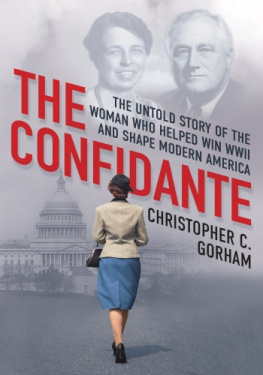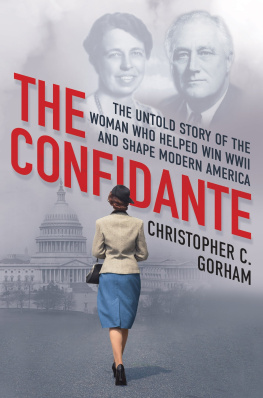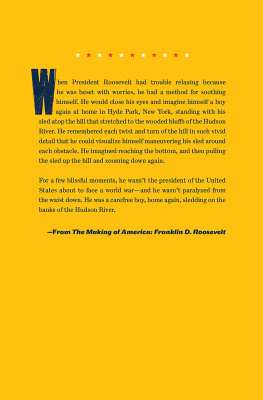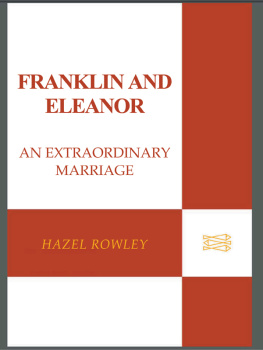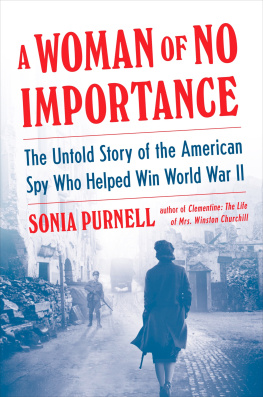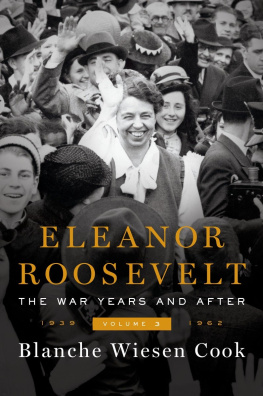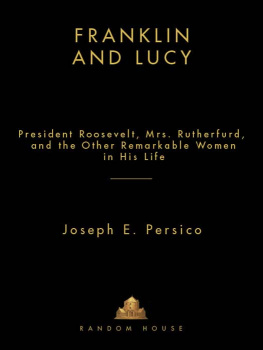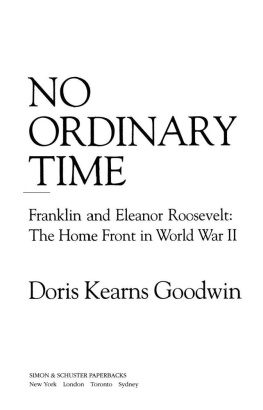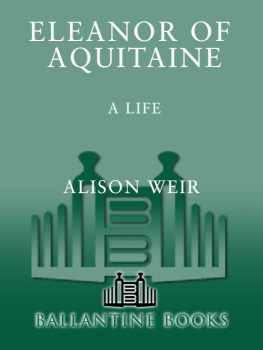THE CONFIDANTE
The Untold Story of the Woman Who Helped Win World War II and Shape Modern America
C HRISTOPHER C. G ORHAM
CITADEL PRESS
Kensington Publishing Corp.
www.kensingtonbooks.com

All copyrighted material within is Attributor Protected.
CITADEL PRESS BOOKS are published by
Kensington Publishing Corp.
119 West 40th Street
New York, NY 10018
Copyright 2023 by Christopher C. Gorham
All rights reserved. No part of this book may be reproduced in any form or by any means without the prior written consent of the publisher, excepting brief quotes used in reviews.
CITADEL PRESS and the Citadel logo are Reg. U.S. Pat. & TM Off.
ISBN: 978-0-8065-4200-3
Library of Congress Control Number: 2022947432
ISBN: 978-0-8065-4201-0 (e-book)
For Elizabeth
Im not a crusader or a reformer, but there are a lot of things happening
you just cannot sit by watching idly.
I decided to do something about it.
A NNA R OSENBERG

Anna, you have quite a book to write someday.
E DWARD R. M URROW
Table of Contents
PROLOGUE
THE EAGLES NEST

K EHLSTEIN MOUNTAIN , B ERCHTESGADEN , B AVARIA , G ERMANY ,
SATURDAY, MAY 19, 1945
A nna Marie Rosenberg stood in the Great Room of the Eagles Nest, Adolf Hitlers redoubt in the Bavarian Alps. She gazed into the valley below, with its deep blue glacial lakes bordered by wildflowers. The jagged peaks on the other side punctured the horizon as shafts of brilliant late-spring sunshine angled through the giant octagonal room. Here, she thought with a chill, the Fhrer had sat in the armchair by the fire, his German Shepherd at his feet, while high-ranking Nazis and their courtesans clinked glasses of looted champagne, their faces flushed as they delighted in transforming Europe into a slaughterhouse.
How could such a beautiful spot have housed such depravity? She thought of her family: Hungarian Jews forced to flee Budapest more than thirty years before due to the caprice of the Austro-Hungarian Emperor. Annas father, Albert Lederer, responded to his exile by becoming a fiercely patriotic American, a posture he encouraged his daughter to adopt as well. My father was vehement in his belief that everyone born outside the United States owed a special obligation to this country, Anna explained later. His influence on me was so great... he drilled into me that I must serve the United States, and that attitude of great love, you couldnt help but assimilate. While Anna and her family struggled to find their footing in New York, back in the Old World the Emperors nephew was assassinated, plunging Europe into the worlds first industrial, modern war. A generation later, dispatched to battle-torn Europe by President Franklin Roosevelt in the fall of 1944 to serve as his personal emissary, Anna found the land of her childhood caught up again in the dragnet of war.
On this second mission Anna was in the heart of the imploding Nazi state. Though she had heard terrible stories of roundups, ghettos, and camps, Anna was unprepared for the tragic scenes she witnessed at the Nordhausen concentration camp just days after its liberation by American troops in April 1945. Wearing a borrowed Womens Army Corps uniform, Anna climbed down from her jeep into a nightmarish world of suffering and anguish. Among pyres of corpses the survivors shuffled in a daze, their striped prison uniforms in rags. Medics, chaplains, and soldiers raced about saving the living, comforting the dying, and digging long trenches for the dead. I saw the survivors, ragged and ageless, Anna recalled; few could stand up. One woman, shocked at the sight of an Allied woman in the camp, slowly approached her. After a moments hesitation, Anna groped for items at the bottom of her purse and the mans briefcase she always carried. She tenderly put them into the womans hands caked with dirt. Anna was ashamed at the insufficiency of her gesture. How could she give lipsticks and note pencils to a starving woman? But seeing the face of the woman as she closed her hands over the small tokens gave Anna hope. To this woman, it was everything. It was the first thing she had owned in years. Everything had been taken from her. Even her name had been blotted out by the Nazi stamp Juden.
Gazing at the edelweiss in the valley below, Anna thought of the young men who would never get to go home. Or who, like her son, Thomas, a lieutenant in the U.S. Army, would return carrying the trauma of what they had seen. In a field hospital in Saint-L, a wounded American brought in a French child, her body torn and shattered by a wood mine left by the retreating Germans. He cried, he cursed, he prayed, Anna said. The soldier promised: Ill pay them back for this.
She thought of the generals she now considered friends: Supreme Allied Commander Dwight D. Eisenhower, Omar Bradley, and George S. Patton. What toll had been taken on them as they saw the terrible price exacted by Hitlers divisions from the beaches of Normandy, across the Rhine River into the very heart of the Third Reich?
But most of all, as she stood there watching dust particles suspended in the sunlight, she thought of the man who had sent her here: President Franklin Delano Roosevelt. She remembered the last time they were together, sharing a lunch in the small sun parlor of the White House on a pleasant spring Saturday in March, just a few weeks before he died. Before leaving the White House that day for what would be his very last time, the President directed her to make this second mission to learn from the soldiers themselves what they hoped for when they returned home.
Anna took one last look at the magnificent Bavarian Alps as the shadows lengthened across the valley; she turned and walked into the library that abutted the Great Room. On one end was a huge stone fireplace, and at the other sat a mahogany desk. She picked up the folded copy of Stars and Stripes that sat on the desktop. An article caught her eye. An American private would be giving a piano recital at the Mozarteum concert hall in nearby Salzburg.
Classical music was one of the few indulgences she allowed herself. Moving through most days like a hummingbird, she prized the moments she found to slip into a hall or conservatory, just another anonymous listener, as the orchestra went through its afternoon rehearsal. She ached to go to the privates performance but knew she could not. There was too much work to be done.
She looked up from the newspaper at the tall bookcase behind the desk. A title caught her attention: 10 Jahre Hitler, 10 Jahre Roosevelt (10 years of Hitler, 10 years of Roosevelt). She stood to her full 53 and with the substantial heels of her WAC boots was able to reach it. Flipping it open, she saw images of Depression-era Americans. A man in a dirty undershirt ladled soup amid the pitiful detritus of a makeshift homeless camp. Idle, unemployed men squatted on a bench, their caps pulled low over their eyes. There were photographs of President Roosevelt shaking the hand of a Black man and with Jewish American leaders. Anna flipped through the pages and saw a photograph of her friend and mentor Bernard Baruch; the German text beneath decried America as the home of mongrels and gangsters. Juxtaposed against these images were columns of neatly uniformed youths marching in a mountain valley, a swastika flag held high. Dozens of strong, tall Aryan women in matching outfits performed calisthenics. Hitler, surrounded by his generals, was fixated on a military map.
Next page
